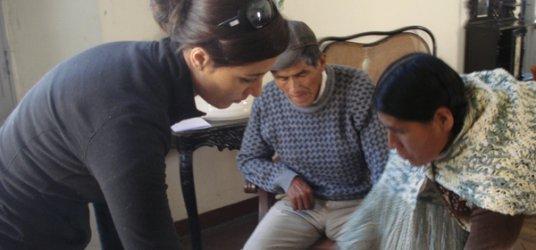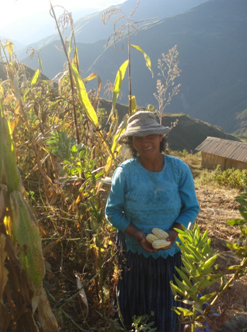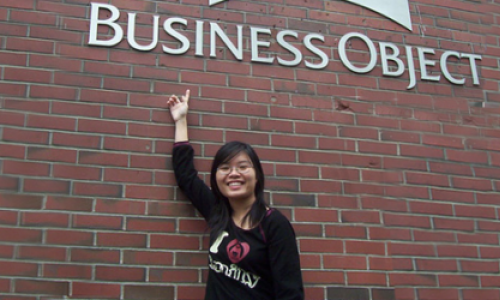
Since its launch in 2005, the Students for Development (SFD) program has been supporting senior-level Canadian university students' participation in internships for a minimum of three months in developing countries and in emerging economies.
On behalf of International Co-op, Melanie Woo got the chance to speak to Deborah regarding her SFD experience. Deborah went on the SFD program in Summer 2011 where she worked with an organization called CECASEM- Centro de Servicio y Integracion de la Mujer, in Bolivia.
Deborah is a second year MA candidate in the Latin American Studies Program. She is also completing a graduate certificate in Development and Sustainability. Based on her work and research in Bolivia she is writing her master's thesis on women's land ownership rights in Bolivia. She hopes to pursue a career in international development.

If you could describe your international experience in one word, what would it be?
Enriching.
What made you decide to do the Students for Development Program?
I am very interested in International Development, I am currently studying Latin America Studies with a focus on development and I thought this would be an excellent opportunity to work for a non-governmental organization in a developing country and help them with their activities while gaining skills in the field.
How did you find your international position?
I found the position though the Centre for Sustainable Community Development at SFU. They are affiliated with a network of NGOs in Bolivia and one of the NGOs in particular matched my preferences.
Why Bolivia?
One of the reasons why I chose Bolivia is because the Centre for Sustainable Community Development works with non-governmental organizations in Bolivia and they were instrumental in putting in contact with these NGOs. The other reason is that Bolivia is the poorest country in South America, there are many issues that need to be addressed in the country, such as for example gender discrimination regarding land ownership, which is also the topic for my research thesis. My choice of country was determined primarily by my interest in working in this developing country.
What did you do as an intern with CECASEM?
As an intern my main job was to conduct research on women’s land rights, assist with the organization’s workshops in rural areas, and assist with fundraising activities. At the end of my internship I wrote a report for the organization on the situation of women’s land rights in La Paz. Through our workshops rural women learned about their land rights.
How did you find it working in a different country?
I very much enjoyed working in a different country, despite some frustrations. On the one hand, it was a great experience because it allowed me to understand how a local NGO from a developing country operates but on the other hand there were some frustrations.
Did you face any challenges throughout the work term?
No particular challenges, except realizing that I could only be in the country for 90 days a year. I wish I had known this before going to Bolivia. In this case I had to pay a fee for each extra day that I stayed in the country.
Did you receive any financial support?
I had my plane tickets offered through SFU by CARE Housing Society. CIDA made my internship possible as I could live in the country, pay for rent and other expenses.
How did you gain or improve your intercultural skills?
This experience was very different from the previous work experiences I have had in the past because I was working with a culture very different from mine - the indigenous Aymara. I improved my intercultural skills by learning about their customs and traditions.
Students might think going on the SFD program is all work. Did you get time to do other activities?
Although I worked every day from 10 to 6:30, in the evening I still had time to go to the gym and socialize with my coworkers and friends. On the weekends I had time to visit La Paz and other cities in Bolivia, attend festivals, concerts and cultural events in my city.
What was your favorite food in Bolivia?
My favorite food was saltenas. They are delicious pastries filled with pork, beef, olives and a spicy sauce. I had them all the time! I also loved all the soups in Bolivia. They are made with different vegetables and are very healthy. Bolivia also has delicious and cheap fruit, such as chirimoyas, palta (huge avocados) and passion fruit.
What was the best thing about the country you worked in?
The country itself: it is so rich culturally and geographically. Bolivians are also very polite and friendly.
What was one of your most memorable moments?
It was during a workshop on economic community development in a rural town. I was helping the locals with the development of a project plan. They were really interested in learning and were asking me for help and I felt very useful. I felt that I was actually contributing to their community, and it was great to see men and women from all ages working together towards a common goal.
Were you able to make valuable connections/networks while abroad?
Yes, I met many representatives from different non-governmental organizations, from UN Women and from the Bolivian government.
Has this experience abroad changed your career or educational goals?
It has not changed my goals but has reinforced them. I still want to pursue a career in development with a focus on Latin America.
What is next for you?
Once I finish my masters I would like to find a job with a NGO.
What would be the one piece of advice you would give to students who are thinking about the SFD program?
Make sure you communicate well with your organization before going to the country to ensure that there will not be any surprises, do some research about your country and make sure you know everything about the visa process.
For more information on CIDA funding and the Students for Development Internship visit this site.
Beyond the Blog
-
Visit the Students for Development Internship to learn more about this former program.
-
Visit the International Co-op Page for new opportunities like Deborah's!
















